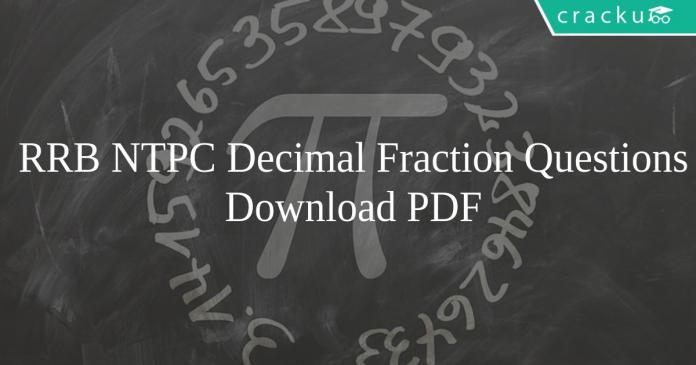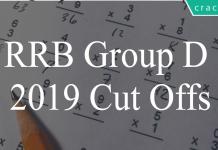RRB NTPC Decimal Fraction Questions PDF
Download RRB NTPC Decimal Fraction Questions and Answers PDF. Top 20 RRB NTPC Maths questions based on asked questions in previous exam papers very important for the Railway NTPC exam.
Download RRB NTPC Decimal Fraction Questions PDF
Take a free mock test for RRB NTPC
Download RRB NTPC Previous Papers PDF
Question 1: What is the value of 8.33% of 72.72% of 28.57% of 462 ?
a) 2
b) 4
c) 6
d) 8
Question 2: What is the value of 33.33% of 44.44% of 37.5% of 216 ?
a) 12
b) 15
c) 18
d) 21
Question 3: What is the value of 63.63% of 55.55% of 14.28% of 693 ?
a) 42
b) 35
c) 49
d) 28
RRB NTPC Previous Papers [Download PDF]
Question 4: What is the value of 1.0474747….?
a) $\dfrac{1047}{9999}$
b) $\dfrac{1037}{99}$
c) $\dfrac{1037}{990}$
d) $\dfrac{1047}{9900}$
Question 5: Find the value of 0.0424242….
a) $\dfrac{42}{99}$
b) $\dfrac{42}{100}$
c) $\dfrac{42}{990}$
d) $\dfrac{42}{90}$
Question 6: When $0.\overline{42}$ is converted into a fraction, what is the value?
a) $\dfrac{2}{5}$
b) $\dfrac{42}{100}$
c) $\dfrac{42}{99}$
d) None of these
Question 7: $\frac{1}{8}$th part of the money of P is equals to $\frac{1}{10}$th part of the money of Q. If the summation of their money is 1080, what will be the difference of their money?
a) 110
b) 120
c) 150
d) 200
Question 8: A fraction is such that when 5 is added to the numerator then its value is 1, again when 6 is added to the denominator then the value is $\frac{1}{2}$
The fraction is
a) $\frac{16}{21}$
b) $\frac{13}{18}$
c) $\frac{11}{16}$
d) $\frac{18}{23}$
Question 9: The sum of a fraction and its reciprocal is $\frac{113}{56}$. Find the fraction.
a) $\frac{7}{8}$
b) $\frac{5}{8}$
c) $\frac{8}{9}$
d) $\frac{3}{7}$
Question 10: Convert the 0.0068 in to vulgar fraction:
a) $\frac{7}{1250}$
b) $\frac{17}{2500}$
c) $\frac{17}{5000}$
d) $\frac{7}{1750}$
18000+ Questions – Free SSC Study Material
Download General Science Notes PDF
Question 11: $\frac{2}{3} \div \frac{1}{3} – \frac{7}{5} * \frac{1}{3}$
a) $\frac{23}{15}$
b) 2
c) $\frac{4}{3}$
d) $\frac{20}{23}$
Question 12: $\frac{3}{5} \div \frac{2}{3} + \frac{1}{7}$
a) $\frac{73}{70}$
b) $\frac{64}{69}$
c) $\frac{32}{35}$
d) $\frac{69}{64}$
Question 13: If A : B = 1 : 4 and B : C = 2 : 3, then what is A : B : C?
a) 1 : 4 : 6
b) 2 : 8 : 7
c) 2 : 8 : 5
d) 1 : 4 : 5
Question 14: If $\frac{x}{a+b}+1=\frac{x}{a-b}+\frac{a-b}{a+b}$, then value of $x$ is
a) 2a-b
b) a+b
c) a-b
d) 2a+b
Question 15: If $(a-2)+\frac{1}{(a+2)}=-1$ then, the value of $(a-2)^2+\frac{1}{(a+2)^2}=-1$ is
a) 7
b) 11
c) 23
d) 27
Question 16: $\frac{a}{1-2a}+\frac{b}{1-2b}+\frac{c}{1-2c}=\frac{1}{2}$ then the value $\frac{1}{1-2a}+\frac{1}{1-2b}+\frac{1}{1-2c}$ is
a) 1
b) 2
c) 3
d) 4
Daily Free RRB Online Tests for RRB Exams
Question 17: Which of the following fraction is greater than 3/5 and less than 4/5?
a) 3/4
b) 6/7
c) 1/2
d) 7/8
Question 18: If $\frac{x}{y}=\frac{4}{9}$, then what is the value of $\frac{(7x^2-19xy+11y^2)}{y^2}$ ?
a) $\frac{59}{81}$
b) $\frac{100}{27}$
c) $\frac{319}{81}$
d) $\frac{913}{81}$
Question 19: What is the value of $\frac{1}{x^{(p-q)}+1}+\frac{1}{x^{(q-p)}+1}$ ?
a) $0$
b) $1$
c) $x^{(p-q)}$
d) $x^{(p+q)}$
Question 20: If $x^2 + x = 19$, then what is the value of $(x + 5)^2+[\frac{1}{(x + 5)^2}]$ ?
a) 77
b) 79
c) 81
d) 83
Download Current Affairs Questions & Answers PDF
Answers & Solutions:
1) Answer (D)
8.33%=1/12
72.72%=8/11
28.57%=2/7
Therefore we have (1/12)*(8/11)*(2/7)*462= (1/12)(8/11)(2/7)*11*7*6
=8
2) Answer (A)
33.33%=1/3
44.44%=4/9
37.5%=3/8
Therefore we have (1/3)(4/9)(3/8)*216=
=12
3) Answer (B)
63.63%=7/11
55.55%=5/9
14.28%=1/7
Therefore we have (7/11)*(5/9)*(1/7)*693=(7*5*11*7*9)/(11*9*7)
=35
4) Answer (C)
Let x = 1.0474747… → (1)
Here, 47 is repeating.
Hence, Multiplying (1) by 1000 to get decimal to the right of 47.
1000x = 1047.474747… → (2)
Multiplying (1) by 10 to get decimal to the left of 47.
10x = 10.474747… → (3)
Subtracting (3) from (2)
1000x – 10x = 1047.474747… – 10.474747…
⇒ 990x = 1037
⇒ x = $\dfrac{1037}{990}$
5) Answer (C)
Let x = 0.0424242… → (1)
Multiplying (1) by 1000 on both sides to get decimal to the right of 42
1000x = 42.424242… → (2)
Multiplying (1) by 10 on both sides to get decimal to the left of 42
10x = 0.424242… → (3)
Subtracting (3) from (2)
1000x – 10x = 42.424242… – 0.424242…
⇒ 990x = 42
⇒ x = $\dfrac{42}{990}$
6) Answer (C)
$0.\overline{42}$ = 0.424242…..
Let x = 0.424242….. → (1)
Here, 2 digits are repeating. Hence, 100 should be multiplied on both sides.
100x = 42.424242…. → (2)
Subtracting (1) from (2)
99x = 42
⇒ x = $\dfrac{42}{99}$
7) Answer (B)
Let’s say P’s money = x and Q’s money is equals to y.
So $\frac{x}{8} = \frac{y}{10}$
And x+y = 1080
Now after solving above two equations, we will get x=480 and y=600
Hence, difference of their money will be = 120
8) Answer (C)
When 5 is added to the numerator, it becomes one. So, the numerator is 5 less than the denominator. When six is added to the denominator, it becomes double the numerator.
So, let the numerator be x, denominator = x + 5
x + 5 + 6 = 2x
So, x = 11
So, the fraction is 11/16
9) Answer (A)
Let the fraction be $x$
According to ques,
=> $x+\frac{1}{x}=\frac{113}{56}$
=> $\frac{x^2+1}{x}=\frac{113}{56}$
=> $56x^2-113x+56=0$
=> $56x^2-49x-64x+56=0$
=> $7x(8x-7)-8(8x-7)=0$
=> $(7x-8)(8x-7)=0$
=> $x=\frac{8}{7},\frac{7}{8}$
=> Ans – (A)
10) Answer (B)
Integer = 0.0068
= $\frac{68}{10000}$
Dividing numerator and denominator by 4,
= $\frac{17}{2500}$
=> Ans – (B)
11) Answer (A)
$\frac{2}{3} * 3 – \frac{7}{15} = \frac{23}{15}$
12) Answer (A)
$\frac{3}{5} * \frac{3}{2} + \frac{1}{7} = \frac{73}{70}$
13) Answer (A)
Given = A : B = 1 : 4 and B : C = 2 : 3
=> $\frac{A}{B}=\frac{1}{4}$ —————–(i)
and $\frac{B}{C}=\frac{2}{3}$ —————–(ii)
Multiplying equation (ii) by ‘2’, we get : $\frac{B}{C}=\frac{4}{6}$
Now, the value of B is same in both equation, => A : B : C = 1 : 4 : 6
=> Ans – (A)
14) Answer (C)
Expression : $\frac{x}{a+b}+1=\frac{x}{a-b}+\frac{a-b}{a+b}$
=> $\frac{x}{a+b}-\frac{x}{a-b}=\frac{a-b}{a+b}-1$
=> $\frac{x(a-b)-x(a+b)}{(a+b)(a-b)}=\frac{(a-b)-(a+b)}{a+b}$
=> $\frac{-2bx}{a-b} = -2b$
=> $x = (a-b)$
=> Ans – (C)
15) Answer (A)
16) Answer (D)
Expression : $\frac{a}{1-2a}+\frac{b}{1-2b}+\frac{c}{1-2c}=\frac{1}{2}$ ——–(i)
Let $\frac{a}{1-2a}=\frac{b}{1-2b}=\frac{c}{1-2c}=k$
Substituting it in equation (i)
=> $k+k+k=3k=\frac{1}{2}$
=> $k=\frac{1}{6}$
Thus, $\frac{a}{1-2a}=\frac{1}{6}$
=> $6a=1-2a$ ————(ii)
=> $6a+2a=8a=1$
=> $a=\frac{1}{8}$
Substituting it in equation (ii), we get :
=> $1-2a=\frac{6}{8}=\frac{3}{4}$
=> $\frac{1}{1-2a}=\frac{4}{3}$
Similarly, $(\frac{1}{1-2b})=(\frac{1}{1-2c})=\frac{4}{3}$
To find : $\frac{1}{1-2a}+\frac{1}{1-2b}+\frac{1}{1-2c}$
= $\frac{4}{3}+\frac{4}{3}+\frac{4}{3}=4$
=> Ans – (D)
17) Answer (A)
3/5 = 0.6 and 4/5 = 0.8
¾ = 0.75
6/7 = 0.85
½ = 0.5
7/8 = 0.875
Hence, option A is right choice.
18) Answer (C)
Given : $\frac{x}{y}=\frac{4}{9}$
Let $x=4$ and $y=9$
To find : $\frac{(7x^2-19xy+11y^2)}{y^2}$
= $\frac{7(4)^2-19(4)(9)+11(9)^2}{(9)^2}$
= $\frac{112-684+891}{81}$
= $\frac{319}{81}$
=> Ans – (C)
19) Answer (B)
Expression : $\frac{1}{x^{(p-q)}+1}+\frac{1}{x^{(q-p)}+1}$
= $\frac{1}{\frac{x^p}{x^q}+1}+\frac{1}{\frac{x^q}{x^p}+1}$
= $\frac{1}{\frac{x^p+x^q}{x^q}}+\frac{1}{\frac{x^p+x^q}{x^p}}$
= $\frac{x^q}{x^p+x^q}+\frac{x^p}{x^p+x^q}$
= $\frac{x^p+x^q}{x^p+x^q}=1$
=> Ans – (B)
20) Answer (B)
To find : $(x + 5)^2+[\frac{1}{(x + 5)^2}]$
Let $(x+5)=a$
=> $x=(a-5)$ ————(i)
Thus, we need to find : $a^2+\frac{1}{a^2}$ ———–(ii)
Given : $x^2 + x = 19$
Substituting value from equation (i),
=> $(a-5)^2+(a-5)=19$
=> $a^2-10a+25+a-5-19=0$
=> $a^2-9a+1=0$
=> $a^2+1=9a$
=> $\frac{a^2+1}{a}=9$
=> $a+\frac{1}{a}=9$
Squaring both sides, we get :
=> $(a+\frac{1}{a})^2=(9)^2$
=> $a^2+\frac{1}{a^2}+2(a)(\frac{1}{a})=81$
=> $a^2+\frac{1}{a^2}=81-2=79$
=> Ans – (B)
DOWNLOAD APP FOR RRB FREE MOCKS
We hope this Decimal Fraction questions for RRB NTPC Exam will be highly useful for your preparation.





